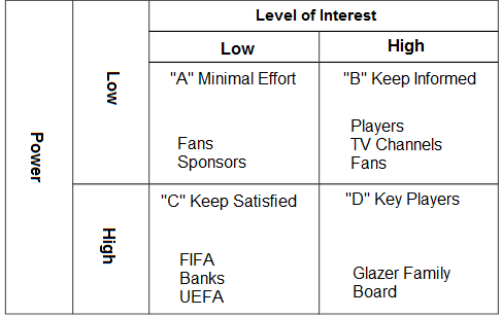Introduction
Business strategy can be described as the long term planning of an enterprise with the aim of achieving its goals and objectives (Cooper and Johnston, 2012). It is the means by which the company carries out its operations to achieve the desired results. The present report is based on Manchester United Football Club (MUFC), commonly known as Man United which is a professional football club based in Old Trafford, Greater Manchester, England that competes in the Premiere League (Scholl et. al., 2014). This report identifies key stakeholders of the company and their interest and power in relation to Stakeholder Mapping model. Also, the diversity in their expectations and their implications is included in this report. Along with this, changes in culture of enterprise over time and its impact on current and future strategy of company is discussed.
A. Identification of Manchester Uniteds key stakeholders and evaluation of their level of power and attention in relation to the Stakeholder Mapping model. How might their expectations differ and possibly conflict?
This section identifies the key stakeholders of Manchester United. Also, with the help of Mendel's Stakeholder Mapping Model, 1884, the diversity in power and interest of the identified key stakeholders of the company is ascertained. Furthermore, this section analyses the variance in expectations of various stakeholders that influence the functioning and policies of the club due to the culture and beliefs of Manchester United. Besides that, the probability of conflicts owing to variation in their expectations is highlighted.
The organisational structure of Manchester United FC is well defined and separated into two aspects: management on the pitch and off the pitch (Capasso and Rossi, 2013). The major reason behind success of MUFC has been a clear description of the responsibilities and authorities of the functions of MUFC. Manchester United follows a strong corporate governance structure. The owner of MU is The Glazer Family who only operate at the Board level and leaves day-to-day management of team to the staff. This makes the 350million fans of MUFC to continue to consider themselves like owners of the club (Kiernan and Porter, 2014). This enables the club in building stronger brand equity for company.
Key stakeholders are those individuals, groups or institutions that directly influence or are influenced by the decisions, policies and objectives of an entity.In relation to MUFC, the key stakeholders identified are The Glazer Family, managers, employees, media, alliances, government, banks and public institutions, investors, media, commercial partners, pressure groups, sponsors, fans, competitors etc (Dolles and Sderman, 2013). Glazer Family and Board is directly linked to the decision making team of MUFC, thus their interest in companys functioning and success is imperative and obvious. Also, being the sole decision makers of the club, they possess a lot of power to make a change or bring any transformation in the management and functioning of club. Also, large firms support Manchester United as a part of their promotional strategy (Cooper and Johnston, 2012). Sponsors like AON have expectations of winning from the club as this would ensure recognition of their name in a positive manner among media and audience (Millward and Poulton, 2014). Also, media is always interested in the operations of club as they always have a news to present to public in relation to the club . The interest in club is due to the high admiration that club receives from fans and supporters.Premier League, UEFA,FIFA and other international sports organizations also possess an interest as they want maximum business from the club so as to gain popularity among masses and gain huge funds from ticket fares.
The goals and objectives of any enterprise are governed by its key stakeholders (Phillips, 2015). These key stakeholders are determined with the help of stakeholder mapping. This process comprises of making decisions upon two aspects. One is deciding how interested the stakeholders are to impress their expectations on the organisational strategical choice (Porter, 2015). Second is to decide upon the extent to which stakeholders possess power to impose their wants. Mendel’s Model is a widely used method for stakeholder mapping. For Manchester United, the stakeholder map is described follows:

(Source: Stakeholder Mapping of Manchester United, 2018)
The impact of using Mendel's Stakeholder Mapping in Manchester United is that it helps the enterprise in gaining an insight into the power and interest that is vested by stakeholders in the company. Using this model in entity leads to ascertainment of the extent to which the actual level of interest and power of stakeholders is aligned with the corporate governance framework of Manchester United (Saunders, 2015). Also, by the aid of stakeholder mapping, the stakeholders fostering and resisting the changes can be easily determined. It has been analysed that while the owners, employees and board encourage the execution of change, fans and supporters resist any change that leads to compromise with the ethics and beliefs of community in relation to the club. It determines the stakeholders who encourage and resist the adoption of the business strategy (Kiernan, 2017).
There were conflicts between the various stakeholder associated with the company. Supporters or fans want the club to follow traditions and values of society and is mainly concerned with the performance of Manchester United in league. On the other hand, shareholders and business partners want to earn maximum profits for the proper functioning and sustenance of club in future. Instances of conflicts between stakeholders have always been evident in relation to MUFC. When decision of restructuring the club was taken due to excess concentration of debts in its financial structure, it gave rise to protests from fans who tried buying the controlling shares from Glazer Family Rossi, Thrassou and Vrontis, 2013). Also when the club did not participate in FA Cup so that they could participate in FIFA Cup, there was undercurrent of dissatisfaction among supporters and resentment from other football clubs (García and Welford, 2015). Fans were disappointed as they witnessed more priority being given to profit making than the traditions and wishes of fans. On the other hand, for the shareholders and business partners, it was a great move as the main objective in relation to future perspective of the club is profitability.
This section identified the key stakeholders of Manchester United and their interest and power with the help of Mendel Stakeholder Mapping Model, 1884. Also, variations in their expectations and probability of conflicts is highlighted. It is concluded that there have always been issues between the owners and management of the club and supporters due to the practice and beliefs followed by Manchester United.
B. Critical evaluation of how key cultural characteristics of Manchester United changed from PLC in 1991 until today
This section covers the changes that have taken place in cultural characteristics of Manchester United from 1991 to today in accordance with Handy's theory of Culture. This theory defines 4 types of cultures namely, task, people, power and role culture. In relation to Manchester United, it follows power and role culture.
After extensive research of Manchester United, it is clear that the team began in 1878 comprising of a group of workers from Lancashire and Yorkshire railways and began playing for local leagues and competitions (Thomsen, 2013). Comparing the past and present organisational culture, there have been many change in the values, beliefs and taken for granted assumptions of Manchester United. With reference to values, when the club was in its earlier phases, the values were acquisition of talented persons in the team and promotion of traditions while plays (Cova and Paranque, 2012). Since MUFC became a Public Limited Company, the values of club have changed to profit making. Beliefs of the company have also evolved over the passage of time. The changes in the values of company could be exhibited only because it followed power culture of Handy's Model which reflects that the owner and management is least affected and influenced by the opinions of other stakeholders of club. Also, It depicts that enterprise follows a rigid corporate structure where changes are implemented without any interruption from external environment. Furthermore, it can be said that having such a structure helps in effectively incorporating the changes with an aim to ensure sustainability of the club in the long run. Earlier, it was the culture of MU to play a game that everyone could enjoy. The earlier years’ values and beliefs gave emphasis upon players and local communities. They concentrated on game and building reputation of victory over local rivals. It was more about winning than making profit unlike the recent change in values and beliefs. The taken for granted assumptions of earlier times were ensuring victory for MUFC which resulted in the club going bankrupt at some point of time (Smith and Lawson, 2012). Nowadays, taken for granted assumptions just comprise of maximum profitability for owners.
Unlike today, there was a strong relationship between fans and players during earlier times. Today, the club has become focused on financial side of game. Manchester United is now marketed as the national team which has taken away itself from their roots and the local community (Bull and Whittam, 2016). Since last some years, MU is more focussed upon building a global reputation through players like David Beckham. Over the years, less and less players are being selected from local community and most players are not from England (Paramio-Salcines, Downs and Grady, 2016). The club is not focussed upon promoting the beliefs of local community and its people now. Manchester United no more operates with the aim of encouraging new and young talented players who need motivation and training to flourish in their career. The sole motive behind functioning of the club has now shifted to money making by efficiently utilising the resources and executing the operations.
This section analysed the changes in culture, values and taken for granted assumptions of Manchester United by taking into account Handy's Model of Culture.
C. Implication of these changes for current and future strategy
This section highlights the implications of changes in culture of Manchester United and mindset of the Board and staff for deciding current and future business strategy of company so as to gain a competitive edge globally.
As the club is becoming more and more money minded and is less concerned about players and local communities, it is facing disappointment from supporters. Also, the high ratio of debts in the financial structure of Manchester United is posing risk to the existence of club (Nordberg, 2012). As a result of changes in beliefs, values and taken for granted assumptions of MUFC, plans are made to make the club advance with the new media technology, in particular, internet and mobile telephone technological developments. They have previously advanced in service industry by using BSkyB to launch their own satellite channel (MUTV). They have produced a premiere movie, provided banking facilities, introduced sports and leisure activities along with a clothing brand (Kolyperas, Morrow and Sparks, 2015). Also, company has opened a cafe, allow weddings on their own Old Trafford grounds and launched their official website.
Looking at the past trends of the company, it can be said that there will be a strategy in future to pull the club out of debts. At present, the strategy in relation to this is paying off less salary to players and staff (Kiernan and Porter, 2014). The same strategy may continue in future also. But along with this arise the risk of shifting of talented players to other competitive clubs. This will, as a result, affect the profitability of company and also pose a threat to name and stake of club in market. Thus, there is a scope for the club to tap advantage of its enormous global reach by transcending the geographic, national, cultural, religious, linguistic and ethnic borders. This reach can be more accelerated with the use of traditional social and digital channels to gain popularity and acceptance from people. This will help the club in making the game worldwide and expanding its reach along with profitability.
This section analysed the implication of changes in culture of Manchester United in respect of current and future scenario.
Conclusion
From the above report, it is concluded that developing a strategy to maintain its stake and brand position in market is imperative for business organisations. Also, it is analysed that every organisation is comprised of various stakeholders who influence and are influenced by the affairs of company. These stakeholders have varying expectations which may give rise to the possibility of conflicts. With the help of Mendel Stakeholder Mapping Model, it is analysed that interest and power of various key stakeholders in an enterprise varies and can be repositioned if it seems desirable or feasible to management. Along with that, it is analysed that culture of an organisation keeps on changing as per scenario. It is imperative for every enterprise to modify its business strategy along with the changes and developments in scenario.
References
- Capasso, A. and Rossi, M. (2013) Systemic value and corporate governance: Exploring the case of professional football teams.
- Dolles, H. and Söderman, S. (2013) The network of value capture in football club management: A framework to develop and analyze competitive advantage in professional team sports. Handbook of research on sport and business, 3(8), pp.418-432.
- Millward, P. and Poulton, G. (2014) Football fandom, mobilization and Herbert Blumer: A social movement analysis of FC United of Manchester. Sociology of Sport Journal, 31(1), pp.1-22.
- Porter, C. (2015) Loyal to what? FC United's ‘shaping walk through football's ‘muck of ages’. Sport in Society, 18(4), pp.452-465.
- Rofe, J. S. (2014) It is a squad game: Manchester United as a diplomatic non-state actor in international affairs. Sport in Society, 17(9), pp.1136-1154.
- Rossi, M., Thrassou, A. and Vrontis, D. (2013) Football performance and strategic choices in Italy and beyond. International Journal of Organizational Analysis, 21(4), pp.546-564.














